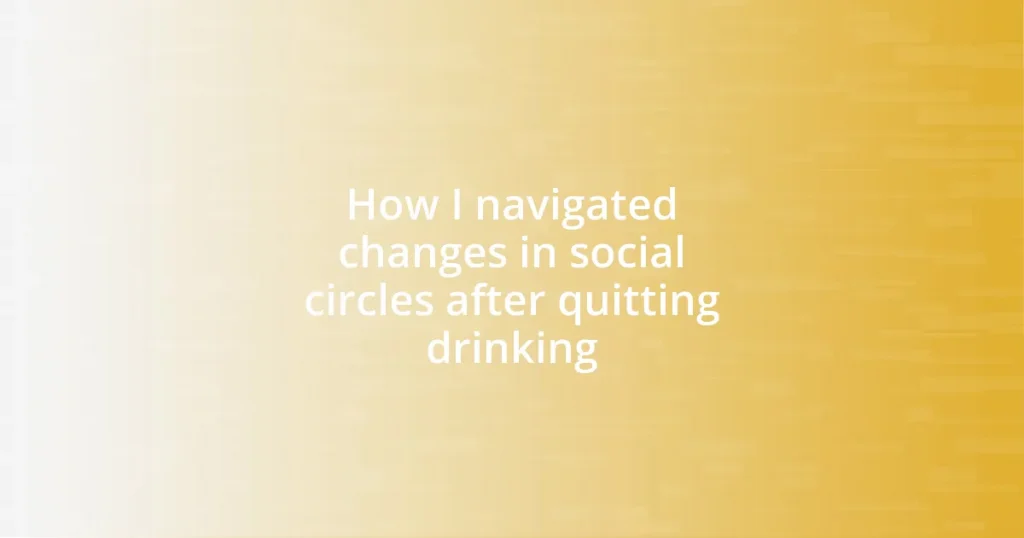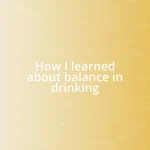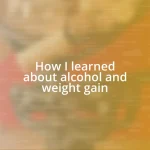Key takeaways:
- Quitting drinking led to a reassessment of friendships, revealing which were based on genuine connections versus shared habits.
- Identifying triggers and challenges helped prepare for social situations, allowing for better management of peer pressure.
- Building a supportive network and engaging in new activities fostered healthier relationships and personal growth.
- Open communication about sobriety strengthened long-term friendships through shared vulnerabilities and mutual support.
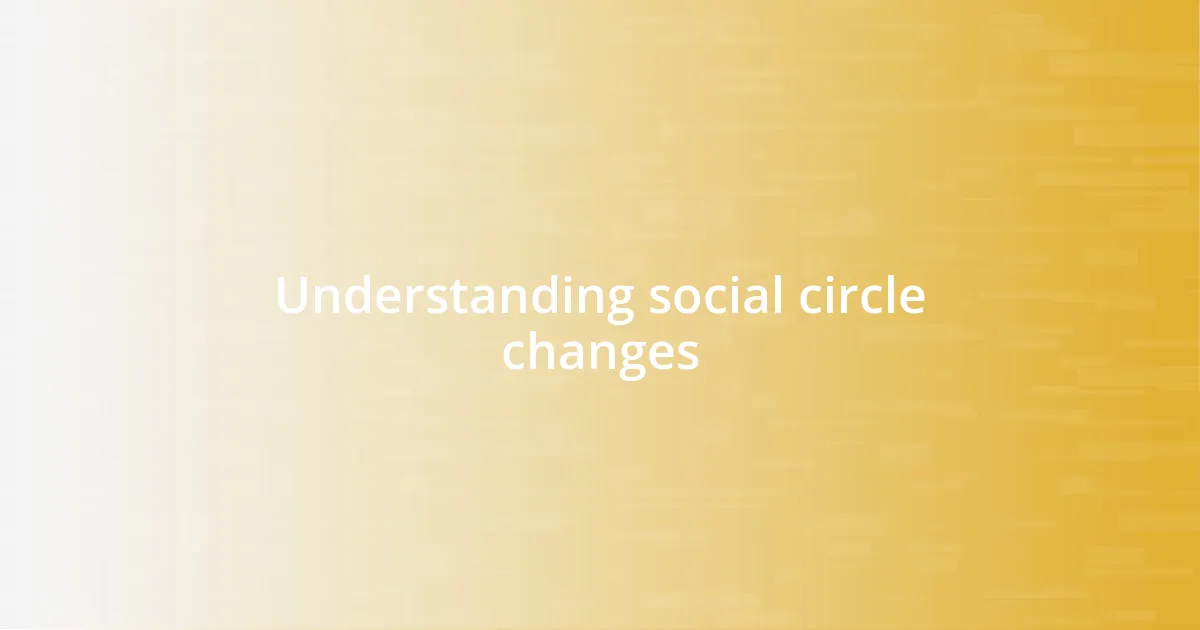
Understanding social circle changes
Social circles can shift dramatically when you make a significant life change, like quitting drinking. I remember the first few weekends after I decided to stop; I felt almost like a ghost at some gatherings. Have you ever been in a room full of people while feeling utterly alone? It’s a strange paradox, isn’t it?
With each passing week, I started to notice who genuinely valued my company and who might have only shared space with me over drinks. I had to confront the discomfort of letting go of relationships that were rooted in social drinking. It felt akin to shedding old skin; painful yet necessary for personal growth. Have you ever wondered how many friendships are built around a shared habit rather than authentic connections?
The journey wasn’t just about losing friends; it became an opportunity to cultivate deeper, more meaningful relationships. I found myself drawn to individuals who shared similar values, and it was like uncovering a treasure trove of conversations that I had missed while amidst the chaotic bar scenes. How liberating it felt to redirect my energy towards connections that nurtured my newfound self!
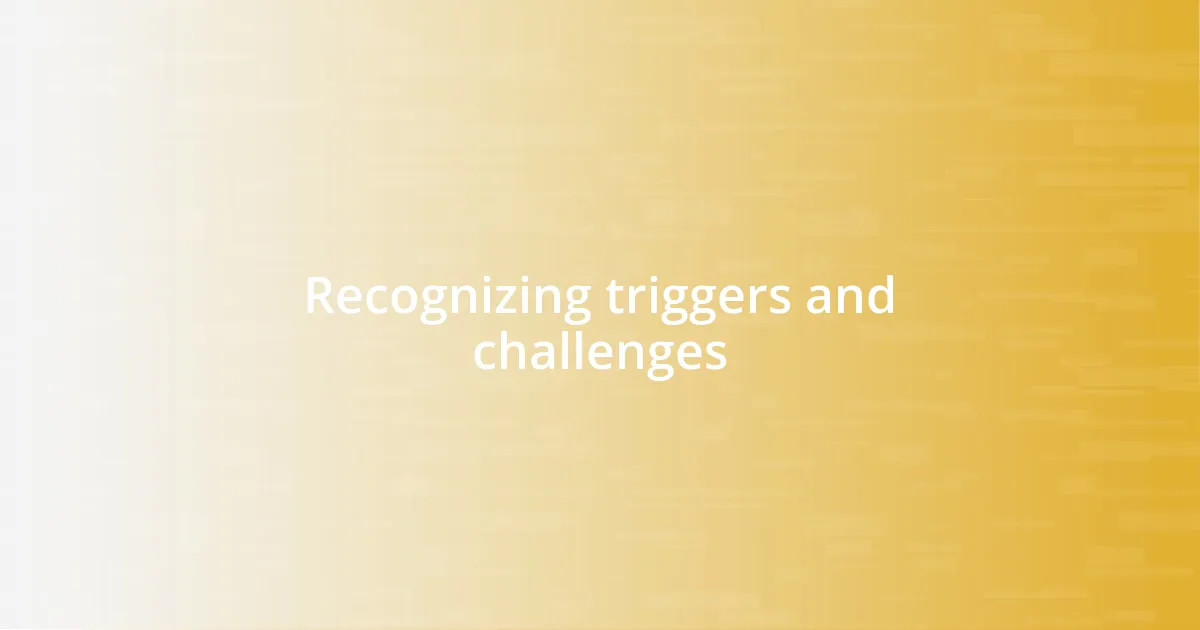
Recognizing triggers and challenges
Recognizing triggers and challenges is a crucial step in adjusting to life after quitting drinking. I found myself caught off guard in certain situations, especially in settings where alcohol was the main event. One evening, I vividly remember attending a friend’s birthday party, and as soon as I walked in, the atmosphere suffocated me with reminders of old habits. It hit me like a wave—suddenly, I was hyper-aware of the drinks being passed around, the laughter over toasts, and the longing to fit in again. Identifying these moments helped me understand my triggers, allowing me to prepare for similar situations in the future.
- Peer Pressure: The urge to blend in can be overwhelming, especially when friends encourage you to have “just one drink.”
- Nostalgia: Certain places or songs may trigger fond memories associated with drinking, making it hard to resist wanting to indulge again.
- Social Norms: Events that revolve around alcohol can create a sense of isolation, making you feel disconnected from others who are engaging in the ritual.
- Emotional States: Feelings of sadness, boredom, or stress can trigger cravings for the escape alcohol used to provide.
Realizing these triggers was instrumental for me. I learned to strategize my approach to social gatherings, sometimes choosing meaningful connections over familiar settings that could lead to temptation. By acknowledging my challenges, I could advocate for myself better and step into my new identity with confidence.
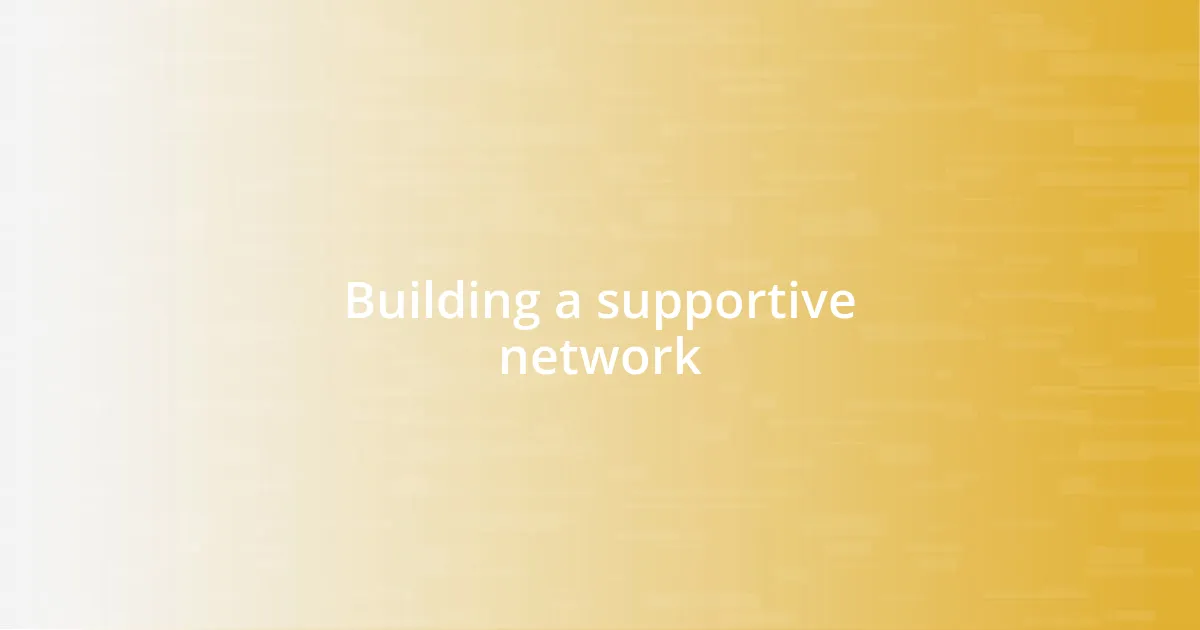
Building a supportive network
Building a supportive network is essential in navigating changes in social circles after quitting drinking. I recall feeling both exhilarated and apprehensive when I reached out to friends who didn’t focus on alcohol. It was like discovering a secret garden; these relationships flourished on mutual respect and life experiences beyond a drink. Have you ever felt that sense of freedom when you could truly be yourself without the pressure of alcohol lingering in the air? I found joy in activities that fostered genuine connections, such as hiking or attending live performances, where conversations flowed naturally and authentically.
As I delved deeper into my new lifestyle, I intentionally surrounded myself with individuals who uplifted me. This effort often meant stepping outside my comfort zone. I joined support groups and local meet-ups focused on hobby interests, and I was amazed by the warmth I received. It’s incredible how a simple shared interest can forge strong friendships. I remember one particular gathering where we exchanged stories and laughter over art, and I felt a deep sense of belonging that I had longed for. Building this network not only enriched my life but also reminded me that supportive relationships exist outside the confines of social drinking.
The journey to cultivate a supportive network also opened my eyes to the importance of setting boundaries. In my experience, I learned to communicate my needs clearly. I often told friends about my decision to quit drinking, and most responded with understanding, some even expressing admiration. I found that sharing my story invited deeper conversations and encouraged others to open up about their struggles. This mutual exchange of experiences created a resilient bond. It made me question—how many relationships could flourish with honesty at their foundation? For me, the answer was a resounding many.
| Type of Network | Description |
|---|---|
| Friends Who Support Your Choice | Those who respect your decision and engage in activities without alcohol. |
| Support Groups | These provide a space to connect with others on similar journeys, fostering understanding. |
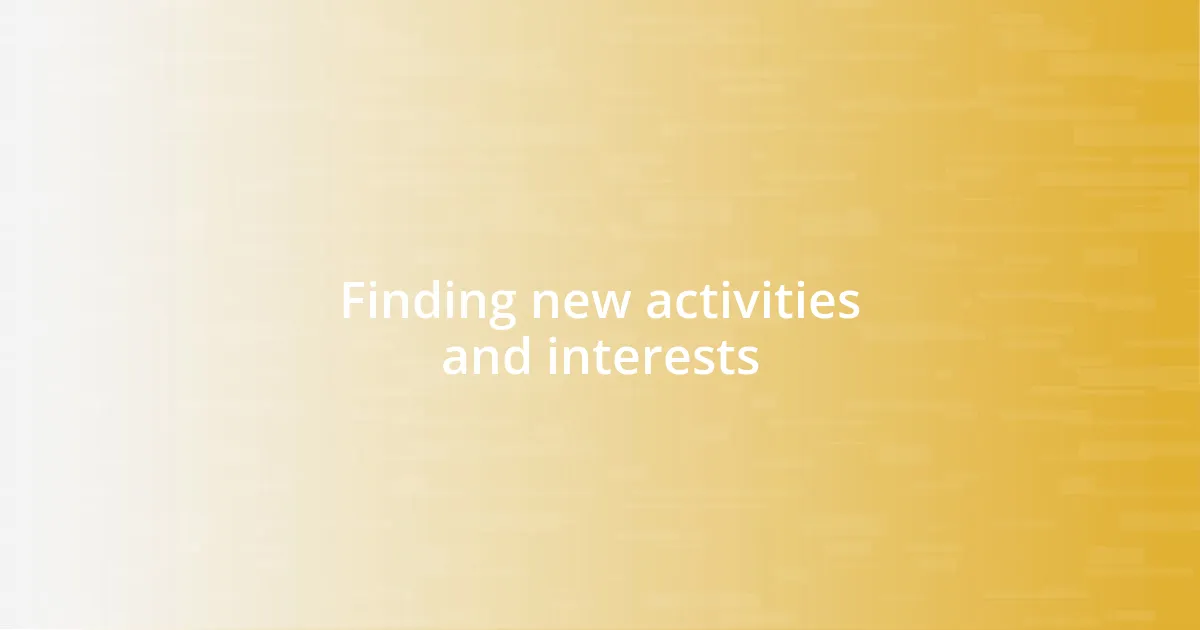
Finding new activities and interests
Finding new activities and interests was essential for me as I navigated life without alcohol. I discovered that picking up new hobbies not only filled my time but also transformed my mindset. For instance, I remember stumbling upon a pottery class. The first time I sat at the wheel, I felt a wave of excitement. Every creation became a beautiful reminder that I was capable of expressing myself in fresh, tangible ways. Have you ever lost yourself in a craft or a creative endeavor? It’s like a breath of fresh air that replaces old habits with new passions.
In addition, exploring outdoor activities opened up a whole new world for me. I decided to join a community hiking group, and I was surprised by the camaraderie that blossomed over shared trails and stunning vistas. I recall one hike where we reached the top of a hill just as the sun dipped below the horizon, painting the sky in hues of orange and pink. It struck me how these moments, filled with nature’s beauty, became perfect opportunities for bonding and laughter—without any alcohol in sight. What’s more invigorating than connecting with others through nature?
Ultimately, the journey led me to invest in experiences that nourished my well-being. I dabbled in cooking classes and even tried my hand at dance, embracing the joy of movement. These activities not only helped fill the void left by drinking but also provided me with a renewed sense of adventure. I vividly remember busting out my best moves at a beginner’s salsa class, laughing along with fellow newbies, completely free from judgment. It reminded me that life could be unpredictable yet incredibly exhilarating. Finding new interests truly reshaped my social life, proving that exploration is key to embracing change.
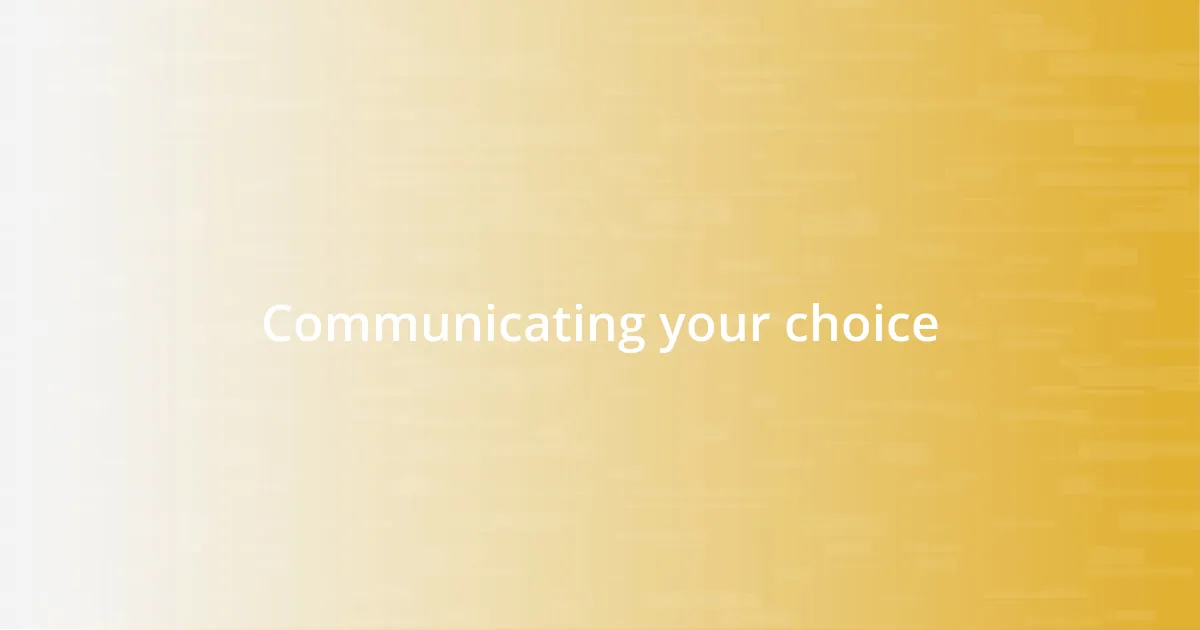
Communicating your choice
When it came to communicating my choice to quit drinking, I quickly learned that honesty was my best ally. I vividly remember one evening with friends when I decided to share my journey. As I spoke, I felt a mix of nerves and relief. To my surprise, many leaned in, genuinely interested. How often do we hold back our truths, fearing judgment? That conversation deepened our friendship and fostered an environment of trust, where everyone felt they could share openly.
I also recognized that body language and energy played a significant role in how my message was received. I made a conscious effort to smile and maintain an open posture, which helped convey confidence in my choice. During gatherings, when someone would offer me a drink, I’d smile and say, “Thanks, but I’m good! Let’s toast with sparkling water instead.” It was casual, yet it demonstrated my commitment to my new lifestyle without alienating anyone. I often wondered, how could a few simple words change the dynamics of a relationship? In my case, they transformed many.
Setting boundaries was another crucial aspect of communication. I remember having a heart-to-heart with my closest friends about my decision. I told them about my struggles with alcohol and reiterated the importance of their support. This discussion revealed deeper layers of understanding among us. Some even shared their experiences with alcohol in moderation, which led to enlightening conversations about our comfort zones. I found that vulnerability often invited others to share their own, creating a safe space to navigate our choices together.
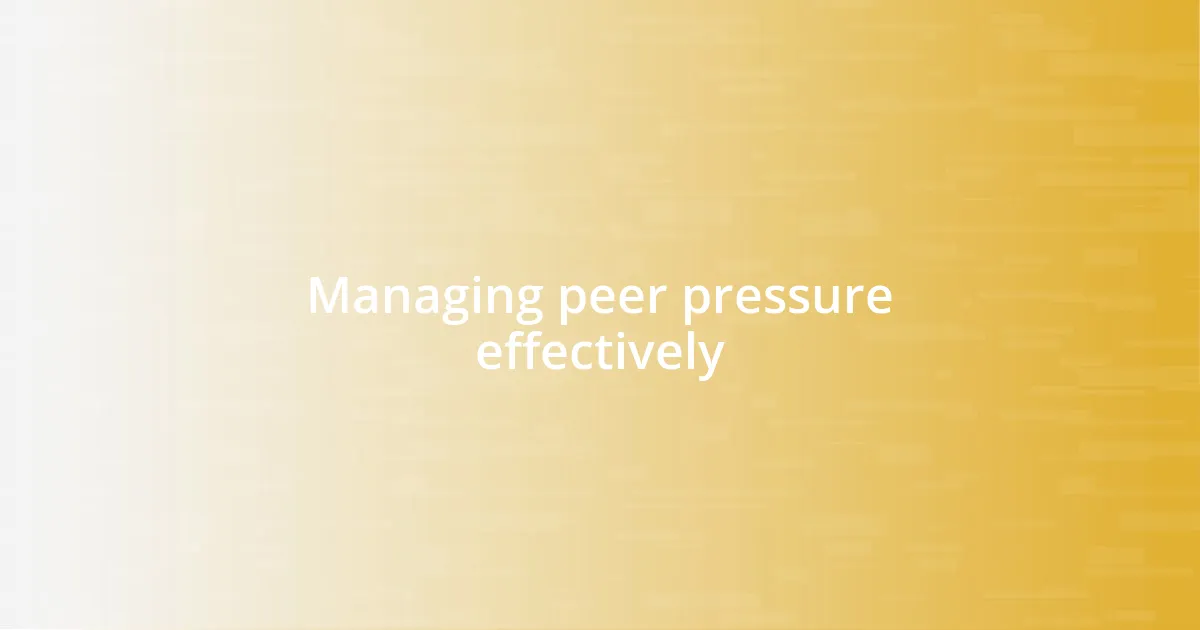
Managing peer pressure effectively
Managing peer pressure became a skill I had to sharpen as I embraced sobriety. I remember attending a friend’s birthday party, where drinks flowed liberally. Honestly, there was a moment when I felt that familiar tug to join in. But I took a deep breath and reminded myself of my commitment. Reflecting on such situations made me realize how empowering it can be to stand firm in my choices, even when everyone around me is indulging. Have you ever felt that pressure? It’s important to acknowledge it but not let it dictate your actions.
In those early days, I found strength in creating strategies. At one gathering, I decided to bring my own non-alcoholic drink, a vibrant mocktail that sparked curiosity. I noticed that when I held a colorful glass, it became a conversation starter instead of a stumbling block. People often asked about my drink, allowing me to share my journey without feeling preachy. What better way to connect than over something visually appealing and delicious? I realized that managing peer pressure didn’t mean isolating myself; rather, it was about reshaping the narrative around my social interactions.
Furthermore, aligning with supportive friends was pivotal in navigating these pressures. I distinctly recall inviting a close friend to join me for coffee instead of drinks. During that conversation, I shared my fears and triumphs around staying sober. That openness not only solidified our bond but also created an ally in social situations. I learned that surrounding myself with understanding individuals made it easier to deflect pressure and be proud of my choices. How often do we underestimate the power of good company? It’s crucial to continuously seek out those who uplift and support our journey, enhancing both our confidence and resilience.
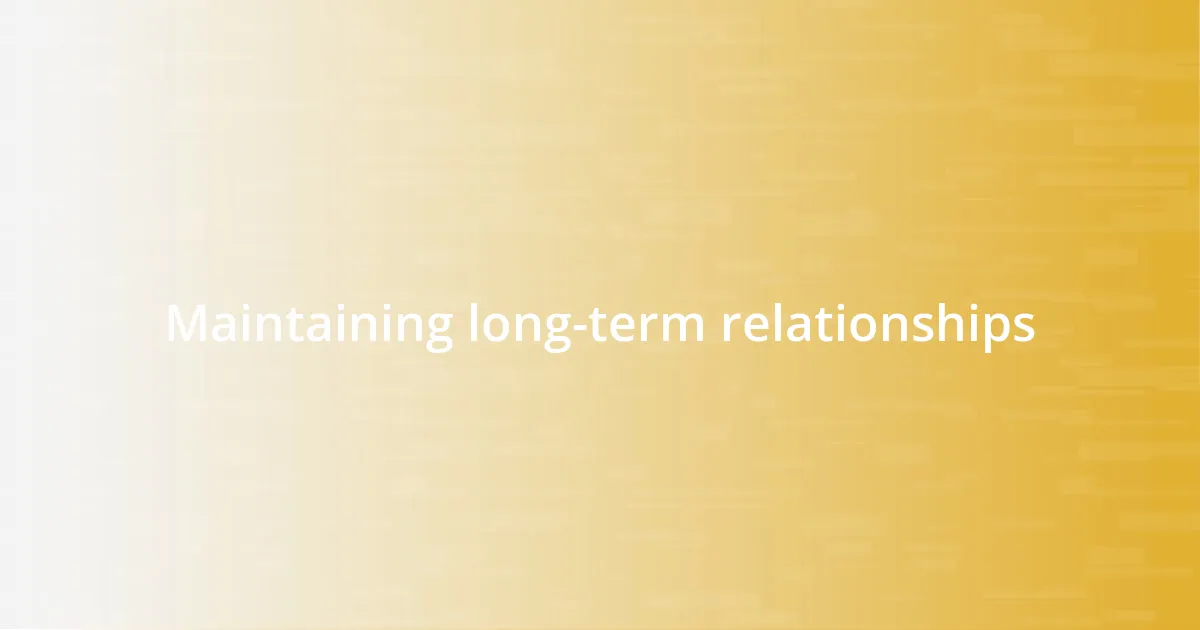
Maintaining long-term relationships
Maintaining long-term relationships required a shift in my perspective. I didn’t realize how much my friendships revolved around social drinking until I stopped. It felt like walking a tightrope at times, trying to keep that bond without the usual crutches. Have you ever felt like the glue holding a group together? I began to see that I could be that glue in different ways—by being present, actively engaging, and finding new shared interests beyond alcohol.
One thing that helped immensely was introducing new activities. I remember planning a game night instead of simply hanging out at the bar. It was transformative—not just for me, but for everyone. We found ourselves laughing over board games, creating fresh memories that didn’t revolve around drinking. I felt a wave of relief wash over me when I noticed my friends enjoying our time together in a new light. Have you ever started a tradition that shifted the dynamics of your relationships? It’s surprising how something as simple as a shared hobby can deepen connections.
Another essential factor was nurturing open dialogue about my journey. I often checked in with my friends, inviting them to share how they felt too. I vividly recall a conversation with a long-time friend who was hesitant at first. But once I opened up about my struggles, he too shared his own experiences with moderation. It was a reminder of how relationships thrive on vulnerability and authenticity. This exchange created a sturdy foundation, allowing us to evolve together rather than drift apart. How often do we underestimate the strength of honest conversations in maintaining the bonds we cherish?










